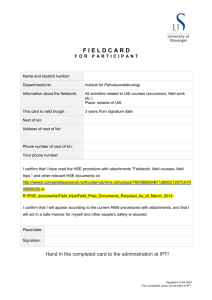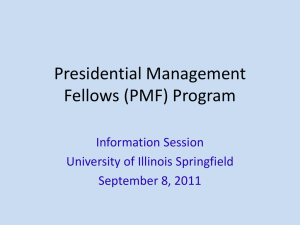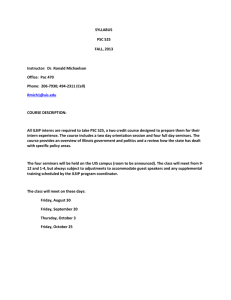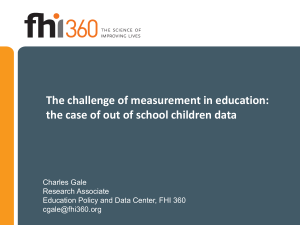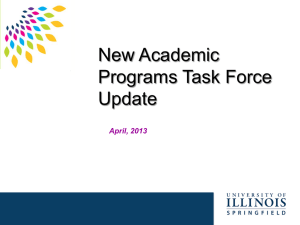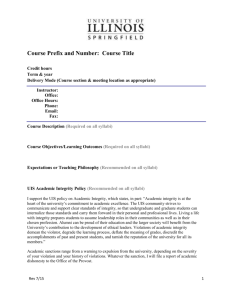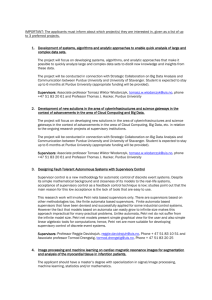SSI- Priorties Survey for Online Learners Analysis
advertisement
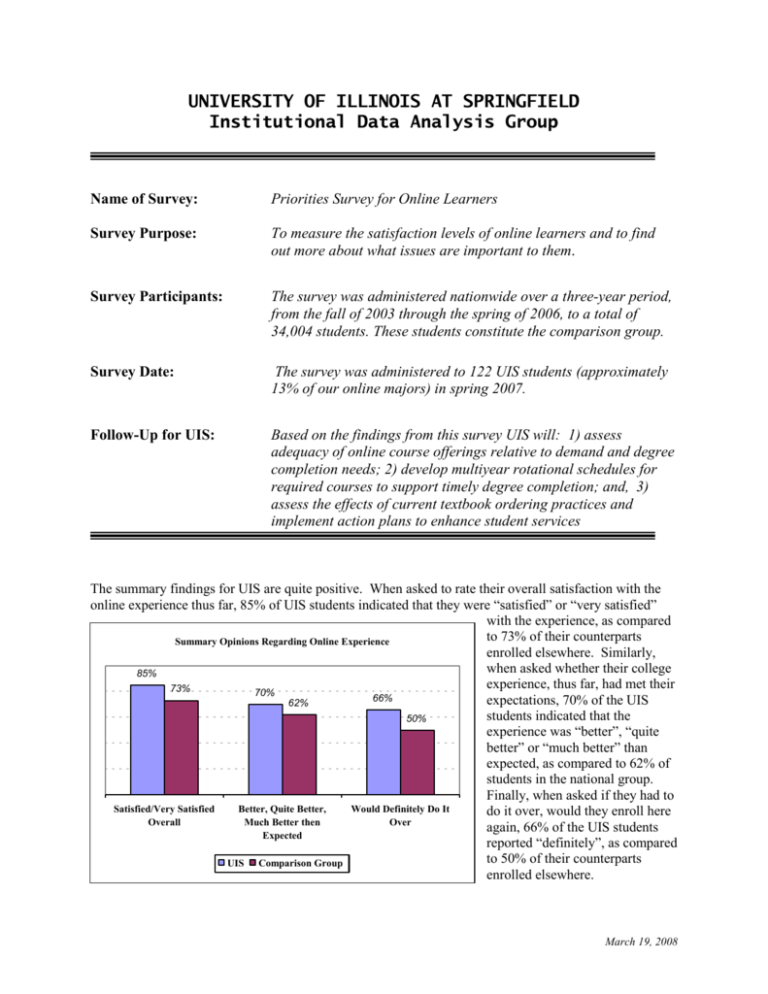
UNIVERSITY OF ILLINOIS AT SPRINGFIELD Institutional Data Analysis Group Name of Survey: Priorities Survey for Online Learners Survey Purpose: To measure the satisfaction levels of online learners and to find out more about what issues are important to them. Survey Participants: The survey was administered nationwide over a three-year period, from the fall of 2003 through the spring of 2006, to a total of 34,004 students. These students constitute the comparison group. Survey Date: The survey was administered to 122 UIS students (approximately 13% of our online majors) in spring 2007. Follow-Up for UIS: Based on the findings from this survey UIS will: 1) assess adequacy of online course offerings relative to demand and degree completion needs; 2) develop multiyear rotational schedules for required courses to support timely degree completion; and, 3) assess the effects of current textbook ordering practices and implement action plans to enhance student services The summary findings for UIS are quite positive. When asked to rate their overall satisfaction with the online experience thus far, 85% of UIS students indicated that they were “satisfied” or “very satisfied” with the experience, as compared to 73% of their counterparts Summary Opinions Regarding Online Experience enrolled elsewhere. Similarly, when asked whether their college 85% experience, thus far, had met their 73% 70% 66% expectations, 70% of the UIS 62% students indicated that the 50% experience was “better”, “quite better” or “much better” than expected, as compared to 62% of students in the national group. Finally, when asked if they had to Satisfied/Very Satisfied Better, Quite Better, Would Definitely Do It do it over, would they enroll here Overall Much Better then Over again, 66% of the UIS students Expected reported “definitely”, as compared to 50% of their counterparts UIS Comparison Group enrolled elsewhere. March 19, 2008 Detailed Summary At UIS, the online student experience is gaining in popularity. However, little is known about the needs, expectations, and priorities of these students. In order to fill this void, the Priorities Survey for Online Learners (PSOL) was administered in spring 2007 to students majoring in an online program. The PSOL is a product of Noel Levitz, the developers of the nationally-normed Student Satisfaction Inventory, and was designed to gauge the degree of importance students place on various academic, enrollment, institutional, instructional, and student services as well as their satisfaction with these services. The difference between the degree of importance and the level of satisfaction provides an indication of the extent to which our students’ expectations are or are not being met. The PSOL also provides comparative data for which the UIS mean satisfaction scores can be considered again those of students at other institutions. UIS administered the PSOL during the spring 2007 semester, with a total of 122 online majors completing the survey. This comprised approximately 13% of the total headcount of online majors enrolled during the spring semester. Demographically speaking, the UIS students participating in the survey were similar to all UIS online majors enrolled during spring 2007. Additionally, the majority of those participating in the survey were undergraduate and part-time students, as were the majority of UIS online majors. The PSOL comparison group scores were based on 34,004 records from 78 institutions representing 26 states. Approximately 1/4 of the schools were from Minnesota, with 56% being in Midwest states, 27% in Southern states, 12% in Western states, and 5% in Northeastern states. The survey included 26 core Likert-scale questions and 10 campus defined questions that were specific to UIS students. For these items, students were asked to provide a rating of both importance and satisfaction on a 7-point scale, where 1 equals the most negative response (“not important at all)” and 7 equals the most positive response (“very important”). For satisfaction, 1 equals the most negative response (“not satisfied at all”) and 7 equals the most positive response (“very satisfied”). Additionally, three summary Likert-scale questions asking for overall satisfaction were included on the survey, as well as a number of multiple choice demographic and enrollment specific items. The results of this survey are presented below. They should be viewed with caution as they are preliminary and reflect our initial pilot of this survey instrument. A. Core Questions The results of the PSOL core questions indicate that UIS students are relatively satisfied with the various services asked about on the survey. Furthermore, when compared to students elsewhere, UIS students were more satisfied on a number of items including: The institution has a good reputation Tuition paid is a worthwhile investment My program advisor is accessible by telephone and e-mail My program advisor helps me work toward career goals Program requirements are clear and reasonable Assessment and evaluation procedures are clear and reasonable The quality of online instruction is excellent Faculty are responsive to student needs This institution responds quickly when I request information March 19, 2008 While our students expressed concern when asked about the sufficiency of offerings within the program of study, so did those in the comparison group. That is, while our students report a lower level of satisfaction relative to the importance placed on the availability of online course offerings at UIS, so do students elsewhere. UIS students reported lower satisfaction with the bookstore than did students elsewhere (i.e., “The bookstore provides timely service to students”). However, it is important to know that our students don’t place as much importance on this service as did their counterparts at other schools.1 B. Campus Defined Questions UIS was provided the opportunity to include 10 customized questions on their administration of the PSOL. Most students were satisfied with these issues in general, with nine of these questions receiving high scores by our students both in terms of importance and satisfaction. These items included: My financial aid application was processed in a timely manner My application for admission was handled in a timely manner It is easy to register for courses at this campus Faculty effectively use technology in their courses Billing policies are reasonable This campus effectively serves my needs as an online student I seldom get the “runaround” when seeking information Transfer credit for students coming here from another college is evaluated in a fair manner My faculty advisor offers the quality of academic advising that I desire There was one campus-defined question where our students reported less satisfaction – “Courses I need are offered often enough”. This question is somewhat similar to the core question of “There are sufficient offerings within my program of study,” with which students also reported less satisfaction. C. Conclusion The results of the PSOL are positive for UIS. Our students expressed higher levels of satisfaction than did their counterparts in schools elsewhere in areas of academic services, enrollment services, instructional services, and student services. Furthermore, our online students’ perceptions of our institution are more positive than the perceptions that their counterparts hold of their respective institutions. Even so, as UIS seeks to maintain excellence in online education, survey findings suggest that it may be appropriate to focus additional attention on our bookstore services and on the scheduling (i.e., frequency and array) of online courses in order to fully address the needs and expectations of our online students. As noted above, this is the first time UIS administered the PSOL, and the results can only be considered preliminary. Although the comparison group included responses from more than 34,000 respondents, not all of the comparison schools are categorical or aspirational peer institutions of UIS. Hopefully, as online programming continues to gain in popularity, the PSOL comparison group will include a larger and more diverse group of students and schools against which UIS student expectations and levels of satisfaction can be compared. 1 The nature of the scale doesn’t allow for us to say if these differences are significantly different. March 19, 2008
